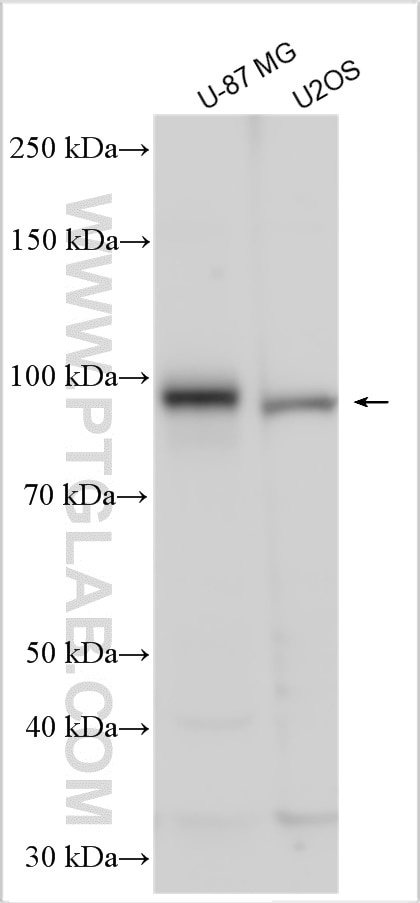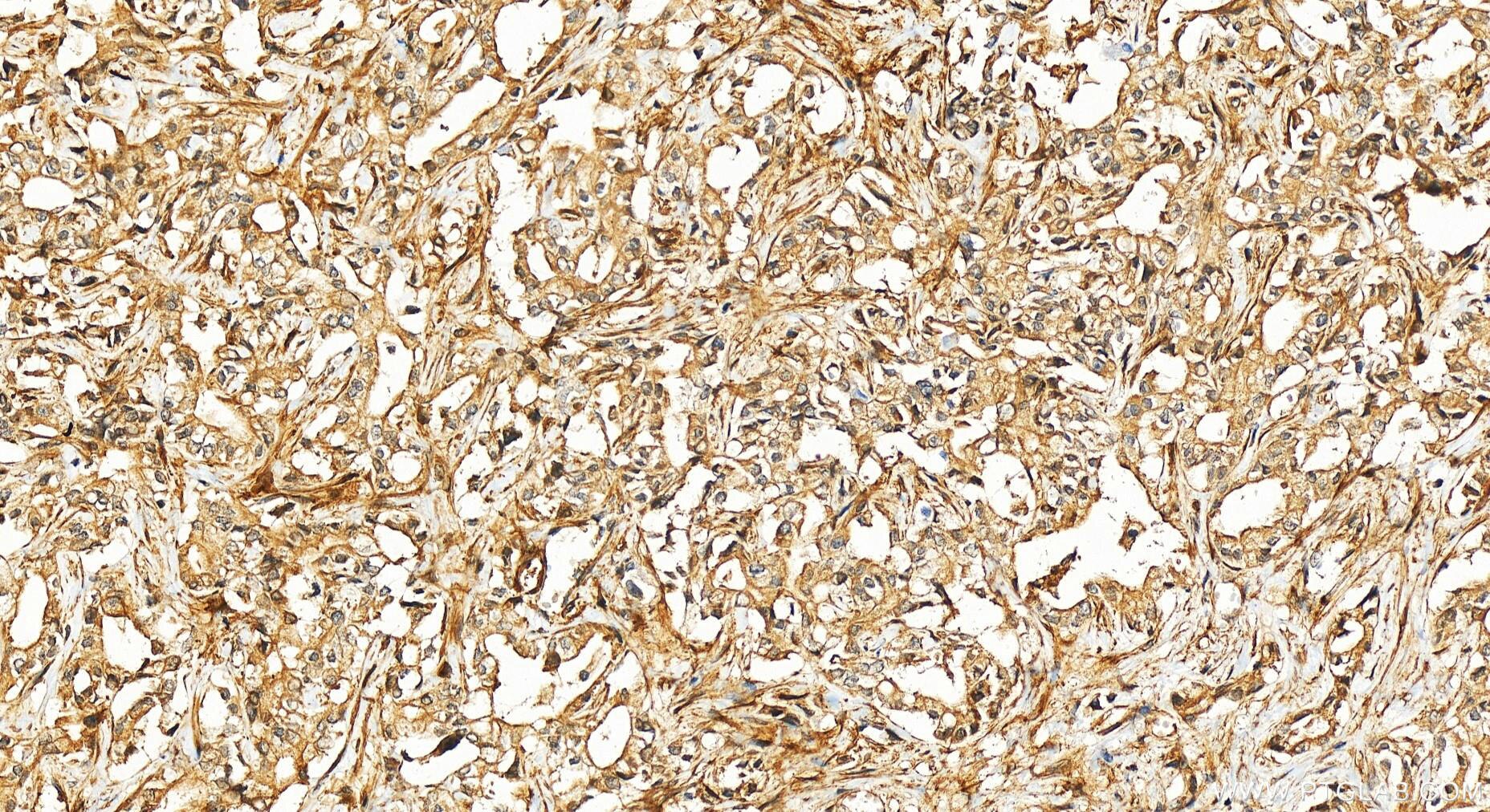Anticorps Polyclonal de lapin anti-FAP
FAP Polyclonal Antibody for WB, IHC, ELISA
Hôte / Isotype
Lapin / IgG
Réactivité testée
Humain et plus (1)
Applications
WB, IHC, IF, ELISA
Conjugaison
Non conjugué
N° de cat : 11779-1-AP
Synonymes
Galerie de données de validation
Applications testées
| Résultats positifs en WB | cellules MG U-87, cellules U2OS |
| Résultats positifs en IHC | human intrahepatic cholangiocarcinoma tissue, il est suggéré de démasquer l'antigène avec un tampon de TE buffer pH 9.0; (*) À défaut, 'le démasquage de l'antigène peut être 'effectué avec un tampon citrate pH 6,0. |
Dilution recommandée
| Application | Dilution |
|---|---|
| Western Blot (WB) | WB : 1:500-1:1000 |
| Immunohistochimie (IHC) | IHC : 1:50-1:500 |
| It is recommended that this reagent should be titrated in each testing system to obtain optimal results. | |
| Sample-dependent, check data in validation data gallery | |
Applications publiées
| WB | See 3 publications below |
| IHC | See 1 publications below |
| IF | See 2 publications below |
Informations sur le produit
11779-1-AP cible FAP dans les applications de WB, IHC, IF, ELISA et montre une réactivité avec des échantillons Humain
| Réactivité | Humain |
| Réactivité citée | Humain, souris |
| Hôte / Isotype | Lapin / IgG |
| Clonalité | Polyclonal |
| Type | Anticorps |
| Immunogène | FAP Protéine recombinante Ag2439 |
| Nom complet | fibroblast activation protein, alpha |
| Masse moléculaire calculée | 760 aa, 88 kDa |
| Poids moléculaire observé | 87-97 kDa |
| Numéro d’acquisition GenBank | BC026250 |
| Symbole du gène | FAP |
| Identification du gène (NCBI) | 2191 |
| Conjugaison | Non conjugué |
| Forme | Liquide |
| Méthode de purification | Purification par affinité contre l'antigène |
| Tampon de stockage | PBS with 0.02% sodium azide and 50% glycerol |
| Conditions de stockage | Stocker à -20°C. Stable pendant un an après l'expédition. L'aliquotage n'est pas nécessaire pour le stockage à -20oC Les 20ul contiennent 0,1% de BSA. |
Informations générales
Fibroblast activation protein-alpha (FAP-alpha) is a cell surface glycoprotein serine protease, which can participate in extracellular matrix degradation and is involved in many cellular processes including tissue remodeling, fibrosis, wound healing, inflammation and tumor growth (PMID: 14751930; 16223769). FAP-alpha is a single transmembrane protein that locates the cytoplasm and plasma membrane. Immunohistochemical studies have shown that FAP-alpha is transiently expressed in certain normal fetal mesenchymal tissues but that normal adult tissues as well as malignant epithelial, neural, and hematopoietic cells are generally FAP-alpha-negative. However, most of the common types of epithelial cancers contain abundant FAP-alpha-reactive stromal fibroblasts (PMID: 7911242).
Protocole
| Product Specific Protocols | |
|---|---|
| WB protocol for FAP antibody 11779-1-AP | Download protocol |
| IHC protocol for FAP antibody 11779-1-AP | Download protocol |
| Standard Protocols | |
|---|---|
| Click here to view our Standard Protocols |
Publications
| Species | Application | Title |
|---|---|---|
Theranostics LINC00982-encoded protein PRDM16-DT regulates CHEK2 splicing to suppress colorectal cancer metastasis and chemoresistance | ||
Mol Cancer Extracellular vesicles of carcinoma-associated fibroblasts creates a pre-metastatic niche in the lung through activating fibroblasts. | ||
Mol Biol Rep Cancer-associated fibroblast-derived exosome Leptin promotes malignant biological lineage in pancreatic ductal adenocarcinoma by regulating ABL2 via miR-224-3p | ||
Sci Rep Fluorofenidone alleviates cigarette smoke exposure-induced chronic lung injury by targeting ferroptosis | ||
Theranostics Dual targeting PET tracer [68Ga]Ga-PSFA-01 in patients with prostate cancers: A pilot exploratory study | ||
J Control Release In vivo FAP-CAR macrophages enhance chemotherapy and immunotherapy against pancreatic cancer by removing the fibrosis barrier |



